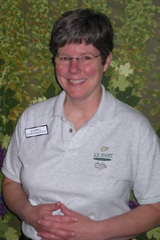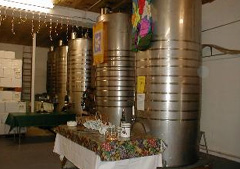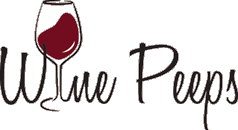Women of Washington Wine: Sherrill Miller of E.B. Foote Winery
By Kori ~ February 22nd, 2010.
Today’s post is part of a series featuring the Women of Washington Wine. In an industry once dominated by men, more and more women are joining the ranks as winery owners, vineyard owners, and winemakers. Being a woman myself, I am fascinated by these women and what they have done and continue to do. Through this series, I hope to introduce you to some of the brightest female faces in the Washington wine industry.
 Sherrill Miller and her late husband, Rich Higginbotham, bought E.B. Foote Winery in 1991. One of the oldest wineries in Washington, E.B. Foote Winery was founded by Eugene Foote in 1978. Sherrill and Rich moved the winery to Burien, Washington, in 1999. Sadly, Rich passed away from Alzheimer’s disease in 2008, and Sherrill became the sole owner and winemaker. Today, E.B. Foote Winery produces about 2,200 cases annually.
Sherrill Miller and her late husband, Rich Higginbotham, bought E.B. Foote Winery in 1991. One of the oldest wineries in Washington, E.B. Foote Winery was founded by Eugene Foote in 1978. Sherrill and Rich moved the winery to Burien, Washington, in 1999. Sadly, Rich passed away from Alzheimer’s disease in 2008, and Sherrill became the sole owner and winemaker. Today, E.B. Foote Winery produces about 2,200 cases annually.
Recently, Sherrill was kind enough to take time out of her busy schedule to answer some questions for me and our Wine Peeps readers.
Highlights from Q&A with Sherrill Miller:
How did you first get involved in the wine business?
My husband and I visited E. B. Foote Winery one Saturday in January 1991. Gene Foote was the owner/winemaker. He had a day job at Boeing and did the winery on the side. Gene was nearing retirement from Boeing and was selling the winery. My husband and I fell in love with the romantic notion of owning a winery. We had several in-depth conversations with Gene, and we decided that we wanted to try being winemakers, even though we had never made wine before. Gene assured us that anyone can make wine. (He’s right, but it takes a bit more than that to make good wine.) So we hocked our house, bought a winery, and then learned how to make wine. We kept our day jobs as our safety net so we could learn what to do and not become homeless if it didn’t work out.
What were the steps that led to where you are now?
We learned to make wine on the job—some from Gene Foote, some from other winemakers we met in the industry, some from reading various books.  We had been serious wine drinkers and knew more than the average wine drinker about wine. We relied on our collective palate to make wine the way we thought it should taste. In our early days, there were winemaker gatherings to share wine and wine knowledge with each other. Keep in mind, there were only about 35 wineries in Washington at that time. We asked lots of questions. We went to wine shows—like the home show for wineries. We could talk to reps about machinery, bottles, barrels, corks, labeling, and merchandise—just about anything that had anything to do with a winery. As we learned more, our wines got better and better. We realized early on that each vintage would be different from any other vintage. While there may be a general format for crafting our wines, we would have to make minor changes each year to bring out the best in the wine. Being minimalistic in our style, those changes would be related to length of time in oak, the kind of oak we used for a particular varietal, and any blending. An important part of our “training” was realizing that we had to drink at least as much other wine as our own. It would be important to keep our palates aware of various wines and winemaking styles. We needed to taste what our customers were tasting and have a broader base than just our wine. It would be very easy to get tunnel vision and think that our wine was better than it really was without some comparison.
Has being a woman been an advantage or a disadvantage in your wine journey?
My husband and I were the winemakers. We each had an equal part in crafting our wines. Our palates were different, and there would be much discussion about a wine and the blending that might go on to be sure we created the best wine we could. I found that when talking about wine or winemaking with customers or other winemakers, gender wasn’t even an issue. The issue was the wine—what vineyards were used, what oak was used, did it go through ML, what blend is it, etc. Whichever one of us happened to be doing the talking was the one the listener assumed was the winemaker.
But life changed in 2003 when my husband was diagnosed with Alzheimer’s disease. Over the next year, I gradually took over all of the responsibilities of the winery and the winemaking. I didn’t notice any change in the way customers or winemakers acted toward me or interacted with me. So even though it has been just me with no “male figure,” gender still has not been an issue for me. For me, the wine industry has been gender-neutral. (My husband passed away in September 2008.)
Do you use the fact that you are a woman to promote your wines? If so, how?
I don’t use gender to promote my wines or my winery. I think the wine should speak for itself. If a wine is well made and customers like it, it shouldn’t matter if it was made by a man or a woman. And I find that it doesn’t matter to my customers.
 Are there more opportunities available to women today in the wine business than when you started?
Are there more opportunities available to women today in the wine business than when you started?
I think in general there are just more opportunities in the wine business than when I started; but again, I don’t think gender has anything to do with it. There are more enology-education opportunities available at colleges here in Washington, and more start-up wineries being created. I think a successful winery has someone or some group of people who are passionate about wine and making wine, they have a strong business sense with enough working capital to get going, and they know something about wine and winemaking. I don’t see gender as being what makes or breaks a winery.
What advice do you have for a woman wanting to get involved in the wine business today?
My advice for anyone wanting to get started in the wine business (or any business for that matter) is learn as much as you can about it and keep learning! Don’t be afraid to ask questions, even the ones you think might be stupid. The only stupid question is the one that didn’t get asked! When we got started, we knew so little that we didn’t even know the questions to ask. But we kept going and asked all the questions we could think of. Pretty soon we had a body of knowledge and experience that things started making sense, and we kept asking questions. Knowledge is power, so be armed with plenty of knowledge (and more questions!).
What are your thoughts about the Washington wine industry, in general?
I find the Washington wine industry to be made up of serious, passionate people who want to make the best wine possible. Everyone I’ve talked to in the industry has been more than happy to share their knowledge and experiences. The Washington wine industry has worked hard to earn the reputation of making excellent wines. It’s in everyone’s best interest that we all make excellent wine. To that end, we all share ideas and help solve problems to help the industry to continue to raise the bar for quality.
In recent years the Washington wine industry has grown at a rapid rate. Do you expect that trend to continue?
I have welcomed the growth of the Washington wine industry. I think there are plenty of customers for all of us, both locally and globally. Competition can make all of us work just that much harder to improve. But some of these new wineries released premium-priced wines as their first release. For various reasons, these wineries felt that $40 or more a bottle was warranted. While the quality of the wine may have matched the price, they immediately narrowed their customer base with the price. Now with the sluggish economy, more and more wine drinkers are looking for a quality wine at a much lower price point, thereby making their customer base even smaller. I think that the wine industry will continue to grow, but at a much slower pace than we have seen in the recent past. And unfortunately some of the established wineries will go under.
What is your vision for the future of E.B. Foote Winery?
My vision for the future of E. B. Foote Winery is two-fold: 1) to continue to focus on the quality of the wines I produce and keep the price affordable; and 2) to continue to focus on my customer service and customer relationships. As an ongoing process, I look at what’s been successful and keep doing it; I look at what should be done differently and change it; I look at what’s not working and stop doing it. I keep an open mind to new wine blends and new winery events. The winery business is always changing, sometimes slowly, sometimes quickly. It’s my goal to keep on top of these changes to make them work for me, instead of the other way around.
Feel free to share any other thoughts that you believe would be of interest to our readers.
I feel it is important to support the community in which I live. I make donations to various auctions being put on by nonprofit organizations. For obvious reasons I am a strong supporter of the Alzheimer’s Association. I made a wine in tribute to my husband called Remembrance. It is a Cabernet/Merlot/Cabernet Franc blend, his favorite wine. I am donating 50% of the purchase price to the Alzheimer’s Association for a particular research project headed up by Dr. Brian Kraemer. So far I have donated nearly $29,000 to this project, and when all of the Remembrance is sold that figure will exceed $100,000. I have an annual fundraising weekend called Step into Spring and Stamp Out Alzheimer’s Disease where 10% of the sales from the weekend will also be donated.
—
Many thanks to Sherrill for sharing her story and thoughts with us. I wish her all the best and will be following her work and E.B. Foote Winery with great interest, and I hope that you will too.
(Photos from E.B. Foote Winery)
Filed under: American Wine, Interview, Washington State Wine, Women of Washington Wine

 Wine Peeps is an independent wine blog dedicated to helping you get the most bang for your buck in wine. We do this through blind tastings of wine from around the world and calculations of
Wine Peeps is an independent wine blog dedicated to helping you get the most bang for your buck in wine. We do this through blind tastings of wine from around the world and calculations of 











A refreshing, wonderful interview with a wonderful women! Sherrill Miller told her story and walk through life in the wine business. Sincere, dedication, open for us to see. There is a message I see from this article.
I also love the fact Sherrill didn’t buy into the gender issue, but I do understand you showcasing women.
Good questions Kori!
Rick
Rick,
Glad you enjoyed the interview. I was intrigued by Sherrill as well. Thanks for understanding and appreciating the focus of this series. I’m simply asking a couple gender related questions to find out what the experiences of women in the Washington wine industry have been. So far, the answers have been quite varied. Cheers!